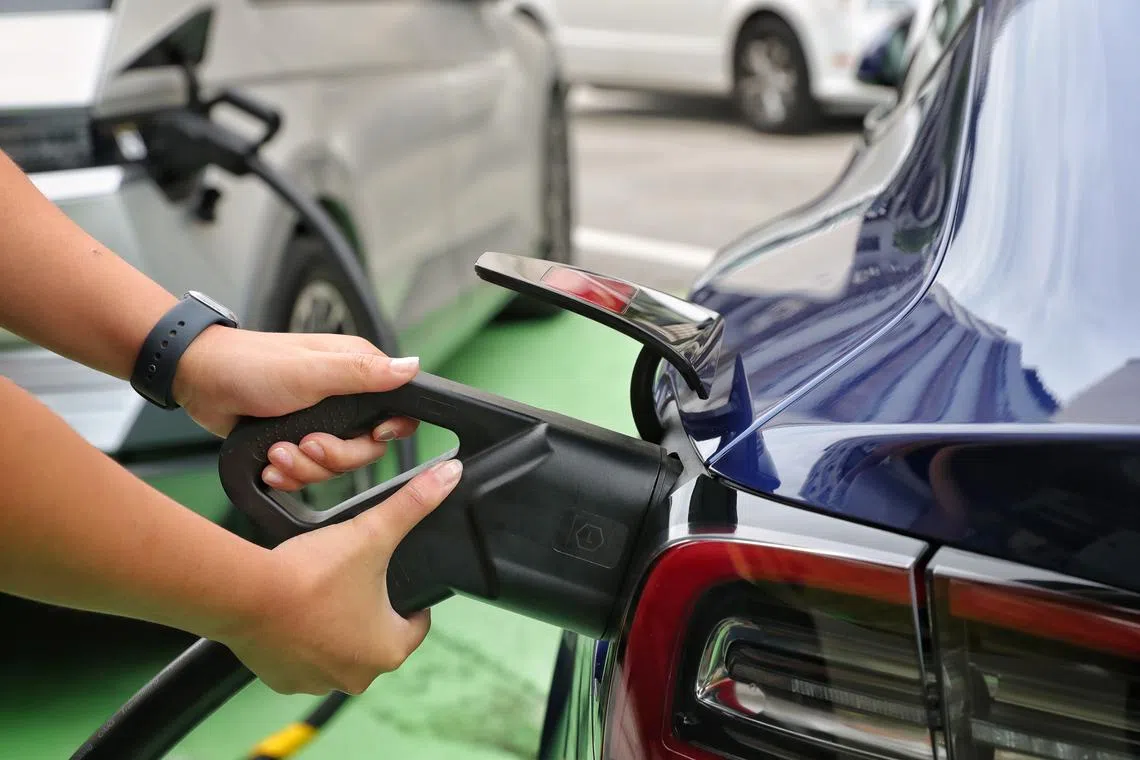Laws proposed to regulate electric vehicle chargers in Singapore, require operators to be licensed
Sign up now: Get ST's newsletters delivered to your inbox

All EV chargers in Singapore will also be regulated under the proposed laws.
ST PHOTO: KEVIN LIM
SINGAPORE – New buildings and those undergoing substantial renovation will have to install a minimum number of electric vehicle (EV) charging points, which is the equivalent of about one in every 25 parking spaces, and put in sufficient power supply to support more chargers in the future.
These were among the features of the Electric Vehicles Charging Bill, which will give the Land Transport Authority (LTA) powers to regulate EV chargers used in Singapore, impose a licensing regime on EV charging operators, and require EV chargers to be provided in buildings.
Introduced in Parliament on Wednesday, the Bill says developments have to put in at least 1.3 kilovolt ampere (kVA) of power per car and motorcycle parking space for EV charging.
This, according to LTA, is equivalent to about one 7.4 kilowatt smart charging point for every five parking spaces.
The developments would also be required to put in a minimum number of charging points which would draw at least one-fifth of that amount of power.
Quantifying the EV charger provision in buildings by the amount of power to supply gives property owners the flexibility to decide on the type of chargers and number of charging spaces.
For instance, within the quota, they can opt to have more EV charging spaces available with slower, and less power-hungry chargers, or fewer spaces equipped with faster chargers.
When the Government put up the proposed legislation for public consultation in June,
LTA said then that, based on the average mileage of car drivers in Singapore and the average effective range of a typical EV, a driver would need to charge the EV only once every five to seven days.
Under the revised provision in the Bill, the minimum power capacity of 1.3kVA per car and motorcycle parking space would support 7.4 kilowatt charging points, with smart charging capability in about one in five spaces.
As for the minimum number of charging points to collectively draw one-fifth of the power supply mandated, it works out to about one in 25 parking spaces being fitted with an operational 7.4kW charger, up from the target of 1 per cent of all parking spaces proposed during public consultation.
LTA said the higher mandatory provision takes into account the “sustained increase” in EV adoption seen in recent months, and reflects the feedback received.
Smart charging capability refers to the ability to vary how much energy goes into plugged-in EVs.
The feature reduces stress on the power grid and enables the charging to be done within power supply limits. Charging speed will likely be faster when there are fewer EVs plugged in than when there are many vehicles charging at the same time.
Charging up an average EV on such chargers will take between four and eight hours.
Developments with fewer than eight car and motorcycle parking spaces will be exempted from having to put in the charging points. However, LTA said that such developments will still have to make the provisions in power supply when they undergo substantial renovation work.
The proposed law would also make it easier to install EV chargers in strata-titled developments like condominiums by lowering the approval threshold needed for such resolutions to be passed to 50 per cent of residents.
The current Building Maintenance and Strata Management Act requires support from up to 90 per cent of the residents before the proposals can be green lit.
The requirement to install chargers and provide additional power supply applies to developments that undergo works that include constructing a new building, rebuilding one, as well as electrical works that result in an increased electrical load of more than 280kVA.
All EV chargers in Singapore will also be regulated under the proposed laws. The installation, certification and use of chargers will have to comply with the updated national EV charging standard announced in March 2022, as well as with the code of practice for electrical installations.
The registered chargers would have to be inspected regularly. Only approved chargers can be advertised for sale.
Businesses that provide EV charging services will have to be licensed. Among the requirements, these companies will have to agree to share data with LTA, as well as have public liability insurance and ensure that the chargers in their network are operational. Their licences will be valid for a fixed period and can be renewed.
In the earlier proposal put up for public feedback, LTA said licensing these commercial operators was necessary for the authority to “effectively enforce against breaches of reliability and quality standards”.
On Wednesday, LTA said the industry and members of the public will be given time to comply with the new law, which is expected to take effect in the second half of 2023.
Existing non-approved chargers can continue to be used and sold for a six-month period after the law comes into effect, while companies providing EV charging services have 12 months to be registered to continue operations.
The proposed law covers fixed chargers, including so-called “battery charge and swap” stations and pantograph chargers, as well as non-fixed chargers. It does not include chargers meant for non-EVs such as personal mobility devices and power-assisted bicycles.
Mobile EV charging services, which are currently not regulated under the revised national EV charging standards, will not be allowed to operate after the transition period following the passing of the Bill.
LTA said it will also consider charging solutions that are not currently covered by the standards, but which have potential to improve access to the charging network safely, under the “Specially Authorised EV Charger” regime. The authority will facilitate trials for and assess such solutions upon receiving applications.
In the first nine months of 2022, EV registrations accounted for more than 10 per cent of all new car registrations, almost triple the adoption rate in 2021.
There are 6,466 fully electric and plug-in hybrid electric cars on the road as at end-September, representing a 77.9 per cent increase from 3,634 as at end-December 2021. For commercial vehicles, which include lorries and buses, the population more than tripled from 462 to 1,430 over the same period.
Singapore aims to deploy 60,000 charging points by 2030.
By end-2025, at least 12,000 EV charging points will be operational at around 2,000 Housing Board carparks islandwide, following a large-scale public EV charging tender that was awarded last week.



